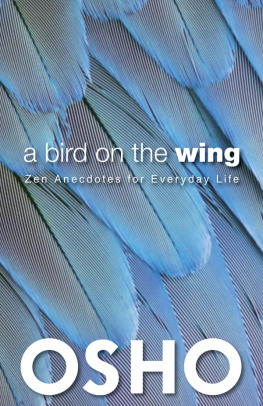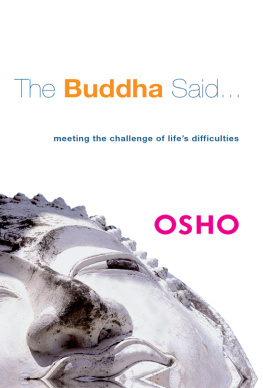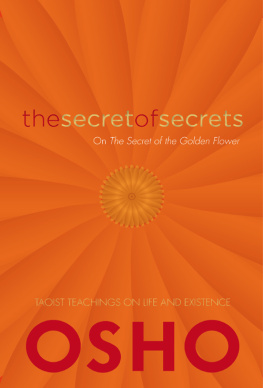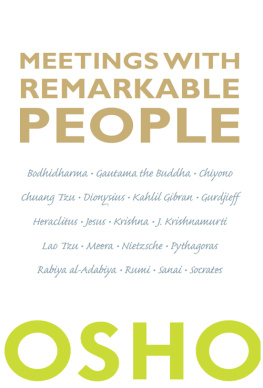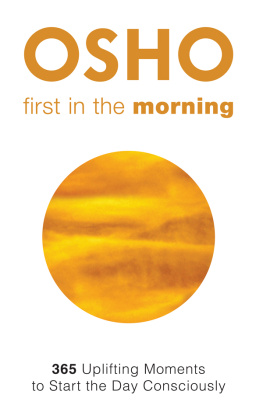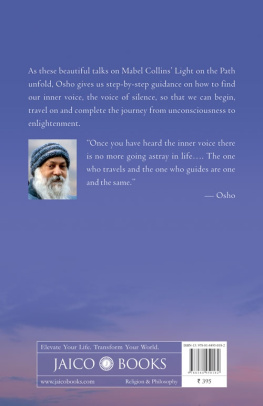Osho - A bird on the wing: Zen anecdotes for everyday life
Here you can read online Osho - A bird on the wing: Zen anecdotes for everyday life full text of the book (entire story) in english for free. Download pdf and epub, get meaning, cover and reviews about this ebook. City: New York, year: 2013, publisher: Osho Media International, genre: Religion. Description of the work, (preface) as well as reviews are available. Best literature library LitArk.com created for fans of good reading and offers a wide selection of genres:
Romance novel
Science fiction
Adventure
Detective
Science
History
Home and family
Prose
Art
Politics
Computer
Non-fiction
Religion
Business
Children
Humor
Choose a favorite category and find really read worthwhile books. Enjoy immersion in the world of imagination, feel the emotions of the characters or learn something new for yourself, make an fascinating discovery.
A bird on the wing: Zen anecdotes for everyday life: summary, description and annotation
We offer to read an annotation, description, summary or preface (depends on what the author of the book "A bird on the wing: Zen anecdotes for everyday life" wrote himself). If you haven't found the necessary information about the book — write in the comments, we will try to find it.
Osho: author's other books
Who wrote A bird on the wing: Zen anecdotes for everyday life? Find out the surname, the name of the author of the book and a list of all author's works by series.
A bird on the wing: Zen anecdotes for everyday life — read online for free the complete book (whole text) full work
Below is the text of the book, divided by pages. System saving the place of the last page read, allows you to conveniently read the book "A bird on the wing: Zen anecdotes for everyday life" online for free, without having to search again every time where you left off. Put a bookmark, and you can go to the page where you finished reading at any time.
Font size:
Interval:
Bookmark:
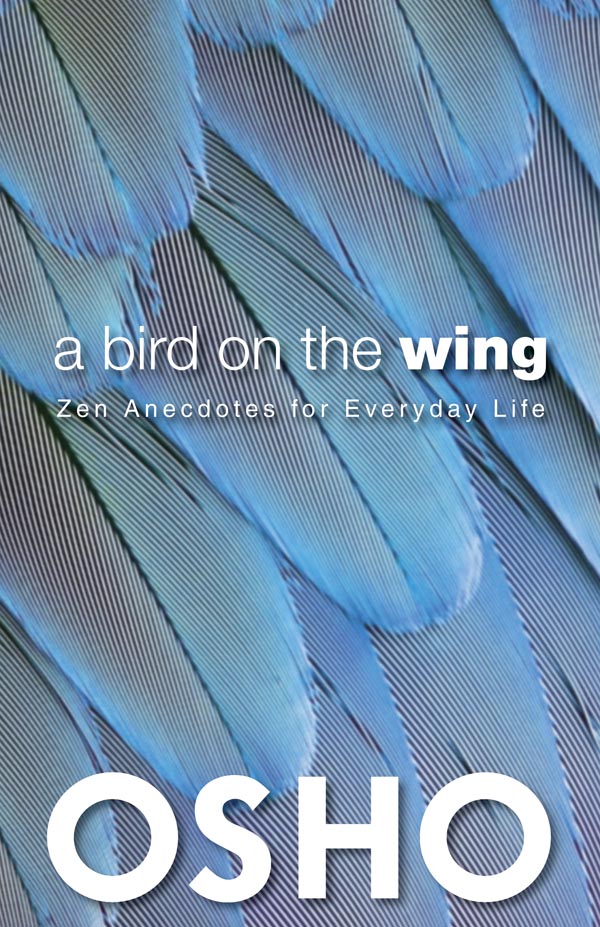
Zen Anecdotes for Everyday Life
OSHO
Copyright 1974, 2013 OSHO International Foundation,
www.osho.com/copyrights
Images and cover design OSHO International Foundation
All rights reserved. No part of this book may be reproduced or transmitted in any form or by any means, electronic or mechanical, including photocopying, recording, or by any information storage and retrieval system, without prior written permission from the publisher.
OSHO is a registered trademark of OSHO International Foundation
www.osho.com/trademarks
A Bird on the Wing is also available as a print edition ISBN-13: 978-0-9836400-8-0
This book is a series of original talks by Osho, given to a live audience. All of Oshos talks have been published in full as books, and are also available as original audio recordings. Audio recordings and the complete text archive can be found via the online OSHO Library at
www.osho.com/library
Published by
OSHO MEDIA INTERNATIONAL
is an imprint of
OSHO INTERNATIONAL
New York Zurich Mumbai
www.osho.com/oshointernational
Library of Congress Catalog-In-Publication Data is available
ISBN-13: 978-0-88050-207-8
The awakening of the buddha is a very easy and relaxed phenomenon. Now that so many people have awakened, the path has become clear-cut; it is no longer hard and arduous. You can playfully enter inside and joyously experience the awakening of awareness. It is not as far away as it was for Gautam Buddha.
For Gautam Buddha it was an absolute unknown. He was searching for it like a blind man, knowing nothing about where he was going. But he was a man of tremendous courage, who for twelve years went on searching, exploring every method available in his time. All the teachers were talking about philosophy and Yoga he went from one teacher to another, and every teacher finally said to him, I can tell you only this much. More than this I dont know myself.
Finally, he remained alone, and he dropped all Yoga disciplines. He had his own five disciples who thought that he was a great ascetic. But when they saw that he had dropped all Yoga discipline, and he was no longer fasting, they dropped him. All five disciples left him: He has fallen from his greatness; he is no longer a saint; he has become ordinary.
But in that ordinariness, when he had dropped everything just being tired and exhausted that full-moon night when the five disciples left him, he slept under the bodhi tree completely free from this world, and completely free from the very search for that world. For the first time he was utterly relaxed: no desire to find anything, no desire to become anything. And in that moment of non-desiring, he suddenly awakened and became a buddha. Buddhahood came to him in a relaxed state.
You dont have to work for twelve years, you can just start from the relaxed state. It was the last point in Gautam Buddhas journey. It can be the first point in your journey.
Osho
The Zen Manifesto: Freedom from Oneself
The Japanese master Nan-in gave audience
to a professor of philosophy.
Serving tea, Nan-in filled his visitors cup,
and kept pouring.
The professor watched the overflow
until he could restrain himself no longer:
Stop!
The cup is overfull, no more will go in.
Nan-in said,
Like this cup,
you are full of your own opinions and speculations.
How can I show you Zen
unless you first empty your cup?
You have come to an even more dangerous person than Nan-in, because an empty cup wont do; the cup has to be broken completely. Even empty, if you are there, then you are full. Even emptiness fills you. If you feel that you are empty, you are not empty at all: you are there. Only the name has changed. Now you call yourself emptiness. The cup wont do at all; it has to be broken completely. Only when you are not, can the tea be poured into you. Only when you are not, is there no need really to pour the tea into you. When you are not, the whole existence begins pouring, the whole existence becomes a shower from every dimension, from every direction. When you are not, the divine is.
The story is beautiful. It was bound to happen to a professor of philosophy. The story says a professor of philosophy came to Nan-in. He must have come for the wrong reasons because a professor of philosophy, as such, is always wrong. Philosophy means intellect, reasoning, thinking, argumentativeness. This is the way to be wrong, because you cannot be in love with existence if you are argumentative. Argument is the barrier. If you argue, you are closed; the whole existence closes to you. Then you are not open and existence is not open to you.
When you argue, you assert. Assertion is violence, aggression, and the truth cannot be known by an aggressive mind; the truth cannot be discovered by violence. You can come to know the truth only when you are in love. But love never argues. There is no argument in love because there is no aggression. And remember, not only that man was a professor of philosophy, you are also the same. Every man carries his own philosophy, and every man in his own way is a professor because you profess your ideas, you believe in them. You have opinions, concepts, and because of opinions and concepts your eyes are dull, they cannot see; your mind is stupid, it cannot know.
Ideas create stupidity because the more the ideas there are, the more the mind is burdened. And how can a burdened mind know? The more ideas there are, the more it is just like dust which has gathered on a mirror. How can the mirror mirror? How can the mirror reflect? Your intelligence is covered by opinions the dust and everyone who is opinionated is bound to be stupid and dull. Thats why professors of philosophy are almost always stupid. They know too much to know at all. They are too burdened. They cannot fly in the sky, they cant have wings. They are so much in the mind that they cant have roots in the earth. They are not grounded in the earth and they are not free to fly into the sky.
And remember, you are all the same. There may be differences of quantity, but every mind is qualitatively the same, because the mind thinks, argues, collects and gathers knowledge, and becomes dull. Only children are intelligent. And if you can retain your childhood, if you continuously reclaim your childhood, you will remain innocent and intelligent. If you gather dust, childhood is lost, innocence is no more: the mind has become dull and stupid. Now you can have philosophies. The more philosophies you have, the more you are far away from the divine.
A religious mind is a nonphilosophical mind. A religious mind is an innocent, intelligent mind. The mirror is clear, the dust has not been gathered, and every day a continuous cleaning goes on. Thats what I call meditation.
This professor of philosophy came to Nan-in. He must have come for wrong reasons: he must have come to receive some answers. Those people who are filled with questions are always in search of answers. And Nan-in cannot give an answer. It is foolish to be concerned with questions and answers. Nan-in can give you a new mind, Nan-in can give you a new being, Nan-in can give you a new existence in which no questions arise. But Nan-in is not interested in answering any particular questions. He is not interested in giving answers. Neither am I.
You must have come here with many questions. It is bound to be so, because the mind gives birth to questions. The mind is a question-creating mechanism. Feed anything into it, out comes a question, and many questions follow. Give an answer to it; immediately it converts it into many questions. You are here, filled with many questions, your cup is already full. No need for Nan-in to pour any tea into it, you are already overflowing.
Font size:
Interval:
Bookmark:
Similar books «A bird on the wing: Zen anecdotes for everyday life»
Look at similar books to A bird on the wing: Zen anecdotes for everyday life. We have selected literature similar in name and meaning in the hope of providing readers with more options to find new, interesting, not yet read works.
Discussion, reviews of the book A bird on the wing: Zen anecdotes for everyday life and just readers' own opinions. Leave your comments, write what you think about the work, its meaning or the main characters. Specify what exactly you liked and what you didn't like, and why you think so.

